
Anyone can suffer from an infection, for example in their stomach, urinary tract or skin. However, a new Danish study shows that a patient’s distress does not necessarily end once the infection has been treated. In fact, ensuing infections can affect your cognitive ability measured by an IQ test.
"Our research shows a correlation between hospitalisation due to infection and impaired cognition corresponding to an IQ score of 1.76 lower than the average. People with five or more hospital contacts with infections had an IQ score of 9.44 lower than the average.
The study thus shows a clear dose-response relationship between the number of infections, and the effect on cognitive ability increased with the temporal proximity of the last infection and with the severity of the infection. Infections in the brain affected the cognitive ability the most, but many other types of infections severe enough to require hospitalisation can also impair a patient’s cognitive ability.
Moreover, it seems that the immune system itself can affect the brain to such an extent that the person’s cognitive ability measured by an IQ test will also be impaired many years after the infection has been cured," explains MD and PhD Michael Eriksen Benrós, who is affiliated with the National Centre for Register-Based Research at Aarhus BSS and the Mental Health Centre Copenhagen, University of Copenhagen.
The study is a nationwide register study tracking 190,000 Danes born between 1974 and 1994, who have had their IQ assessed between 2006 and 2012. 35% of these individuals had a hospital contact with infections before the IQ testing was conducted.
According to Senior Researcher Michael Eriksen Benrós, part of the explanation of the increased risk of impaired cognition following an infection may be as follows: "Infections can affect the brain directly, but also through peripheral inflammation, which affects the brain and our mental capacity. Infections have previously been associated with both depression and schizophrenia, and it has also been proven to affect the cognitive ability of patients suffering from dementia. This is the first major study to suggest that infections can also affect the brain and the cognitive ability in healthy individuals."
